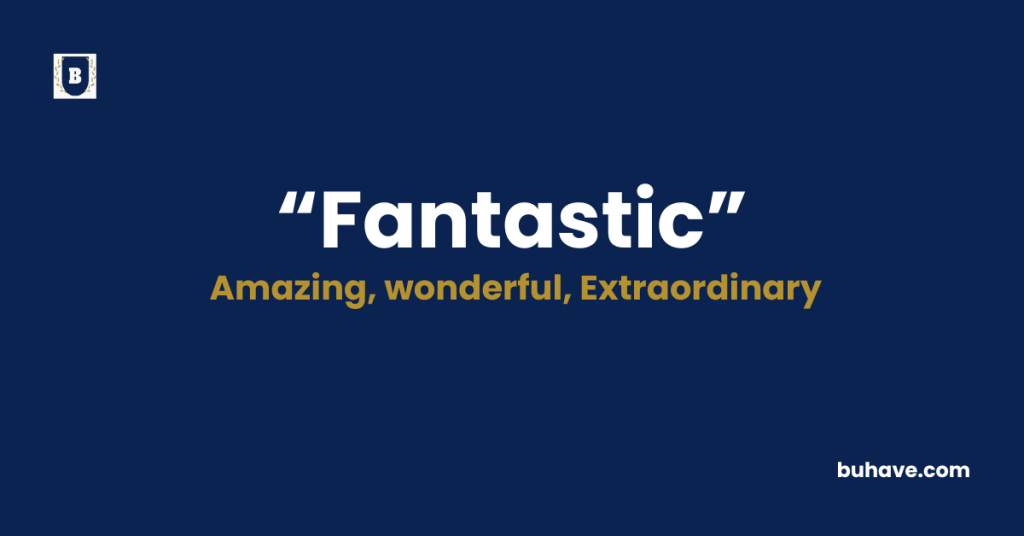The word ‘Fantastic’ (Adjective) describes something that is extremely good, impressive, or imaginative. First of all, people use it to express strong approval or excitement. in this guide, you’ll learn the full definition, synonyms, antonyms, etymology, and real-life examples of how to use ‘Fantastic’ correctly in sentences.
Fantastic Explained in Depth
A complete and detailed guide to the words Fantastic including meaning, definition, examples, etymology, synonyms, and antonyms.
Meanings of Fantastic
Fantastic” means something that feels extremely good, impressive, or unusually excellent. First of all, people often use this word to describe experiences, ideas, or things that feel better than expected. Moreover, it adds a strong sense of excitement or amazement, especially when something seems almost too good to be real. In addition, “fantastic” can describe things that are imaginary or creative, especially in stories or art. For example, when someone says, “That meal was fantastic,” they’re expressing genuine joy and satisfaction. As a result, the word often creates a positive, uplifting feeling.
Therefore, when you describe something as fantastic, you emphasize how special, exciting, or impressive it truly feels.
Definition:
“Fantastic” describes something that is extremely good, impressive, or imaginative. First of all, people use it to express strong approval or excitement, especially when something turns out much better than expected. Moreover, it often conveys a sense of wonder or amazement—whether about a performance, an idea, or even someone’s achievement. In addition, the word can apply to things that are fictional or dream-like, such as a fantastic story filled with magical creatures. As a result, “fantastic” fits both real-life excellence and imaginative creativity.
Therefore, when you call something fantastic, you highlight how exceptional or extraordinary it truly is.
Etymology:
The word “fantastic” comes from the Latin word phantasticus, which meant imaginary or unreal. First of all, this Latin word came from the Greek word phantastikos, which referred to the power of imagination or creating mental images.
Moreover, in ancient times, people used this root to describe things that existed more in the mind than in reality. Later, during the Middle English period, the word entered English through Old French as fantastique, keeping its meaning tied to imagination and wonder. Over time, the meaning expanded. In addition to describing imaginary or magical things, it also began to express excitement, excellence, or something beyond normal experience.
Therefore, today, “fantastic” can mean both wonderfully creative or simply very good—depending on how people use it.
Example Sentence:
- First of all, you did a fantastic job on your presentation—it really impressed the entire class.
- Moreover, the view from the mountain top looked fantastic, especially as the sun began to set.
- In addition, she told a fantastic story filled with dragons, secret caves, and magical treasures.
- As a result of their teamwork, they created a fantastic project that stood out from the rest.
- Therefore, after such a fantastic meal, we decided to thank the chef in person.
Fantastic Synonyms:
- Amazing
- Wonderful
- Extraordinary
- Incredible
- Spectacular
- Brilliant
- Spectacular
- Phenomenal
- Terrific
- Outstanding
Fantastic Antonyms:
- Ordinary
- Terrible
- Mediocre
- Unimpressive
- Dull
- Unimpressive
- Bad
- Disappointing
- Mediocre
- Unremarkable
FAQs about Fantastic
Here’s a FAQ-style guide about the word “Fantastic”
1. What does “fantastic” mean?
“Fantastic” is an adjective with several meanings depending on context:
- Excellent or amazing (informal praise)
- Unrealistic or imaginative, like something out of fantasy
- Strange or fanciful, sometimes even bizarre or surreal
2. How is “fantastic” used in a sentence?
- “You did a fantastic job on your presentation!” (excellent)
- “The movie takes place in a fantastic world full of dragons.” (imaginary)
- “He came up with a fantastic excuse that no one believed.” (unreal or absurd)
3. Is “fantastic” always positive?
Mostly, yes especially in modern, casual use where it means “great” or “awesome.”
However, in older or more literary contexts, it can mean unrealistic, imaginary, or absurd, not necessarily good.
4. What are some synonyms for “fantastic”?
Depending on usage:
- Wonderful, amazing, awesome (for excellence)
- Imaginary, fanciful, mythical (for fantasy)
- Absurd, unbelievable, far-fetched (for unrealistic ideas)
5. What’s the difference between “fantastic” and “fantastical”?
- Fantastic is more commonly used in everyday language to mean “great.”
- Fantastical is more literary and emphasizes imaginative or fantasy-based elements.
Example:
- “That was a fantastic meal.” (excellent)
- “The novel was set in a fantastical world.” (imaginative)
6. Can “fantastic” be used formally?
Not often. “Fantastic” is generally informal and enthusiastic. In formal writing, words like “excellent,” “remarkable,” or “outstanding” are preferred.
7. What is the origin of the word “fantastic”?
It comes from the Greek phantastikos, meaning able to imagine or create images, via Latin and Old French. Originally, it referred to something imaginary or visionary.

















